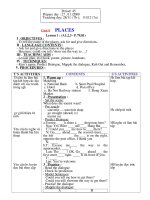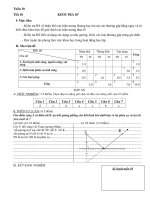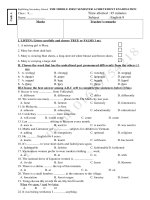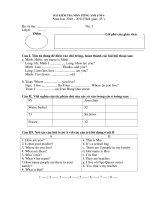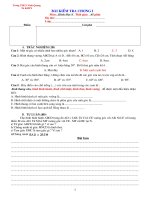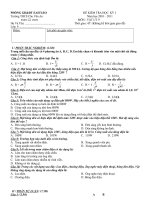Bai KT Anh 8So 4co ma tran
Bạn đang xem bản rút gọn của tài liệu. Xem và tải ngay bản đầy đủ của tài liệu tại đây (117.71 KB, 4 trang )
<span class='text_page_counter'>(1)</span><div class='page_container' data-page=1>
<b>I. MATRIX</b>
<b> </b>
<b>Cấp độ</b>
<b>Tên Chủ đề</b>
(nội dung)
<b>Nhận biết</b> <b>Thông hiểu</b> <b>Vận dụng</b>
<b>Cộng</b>
<b>Cấp độ thấp</b> <b>Cấp độ cao</b>
TNKQ TL TNKQ TL TNKQ TL <sub>KQ</sub>TN TL
<b>Chủ đề 1</b>
Odd one out
<b>5 câu</b>
2 điểm
5 câu
2 điểm
<b>Chủ đề 2</b>
Choose A,B, C or D to
complete the sentences
<b>10 câu</b>
2 điểm
10 câu
2 điểm
<b>Chủ đề 3:</b>
Put the verb in correct
tense.
<b>5 câu</b>
2 điểm
5 câu
2 điểm
<b>Chủ đề 4. Read the </b>
passage, then answer
the questions:
<b>5 câu</b>
2 điểm
1
5 câu
2 điểm
<b>Chủ đề 5:</b>
Rewrite the sentence
with the same meaning
<b>5 câu</b>
2 điểm
5 câu
2 điểm
Tổng số câu
Tổng số điểm
</div>
<span class='text_page_counter'>(2)</span><div class='page_container' data-page=2>
<b>Le Hong Phong secondary school Date: ……/ ……./ 2012</b>
<b>Full name : ……… </b> <b>English Written Test i ( No 4)</b>
<b>Class : 8A </b> <b> Time : 45 minutes</b>
<b>Mark</b> <b>Teacher’s remarks</b>
<b>I. </b>
Odd one out.
a. clutch<b>ed</b> b. chang<b>ed </b> c. stopp<b>ed </b> d. look<b>ed</b>
a. <b>c</b>ompile b. <b>c</b>omplain c. <b>c</b>arol d. <b>c</b>ity
a. w<b>o</b>nder b. c<b>o</b>mpetition c. s<b>o</b>metimes d. d<b>o</b>ne
a. lav<b>a</b> b. v<b>a</b>lley c. festiv<b>a</b>l d. <b>a</b>ward
a. <b>s</b>urround b. <b>s</b>ightseeing c. pri<b>s</b>on d. <b>s</b>eparate
<b>II. Choose the best answer:</b>
1. The radio was (repaired / repairing / repair / repairs) by Tim yesterday
2. How about (going/ to go/ went/ gone) to the market?
3. She asked me (<i><b>if I live/ whether I live/if I lived /if I am living</b>) in Bu Nho.</i>
4. I was reading (when/ while/ at which/ at time) my sisters were playing with their dolls.
5. Millions of Christmas cards (were sent/ are sent/ send/ is sending) every year.
6. Jane saw her old friend while she (crossed/ is crossing/ was crossing/ crosses) the street.
7. I must go now I promised (not being/ not to be/ to not be/ not be) late.
8. She asked me (if I have/ whether I had/ If I have had/ whether I have had) a driving license.
9. I don’t know where (going/ went/ to go/ can I go) in this city.
10. Lan (burnt/ was burning/ has burnt/ burn) her hand while she was cooking the dinner.
<b>III. Give the correct forms of the words in brackets.</b>
1. He <b>(see)</b> ………this film before.
2. When I <b>(do)</b> ………homework last night, he <b>(arrive)</b> ………
3. I (<b>meet)</b> ……… Thuy yesterday at the bus stop.
4. Huong <b>(watch)</b> ……….. TV at 8 o'clock last night.
<b>IV. Read the following passage then answer the questions:</b>
Viet Nam’s New Year is celebrated according to the Lunar calendar. It begins between January twenty-first
and February nineteenth. The exact date changes from year to year. Vietnamese people usually make
preparations for the holiday several weeks before Tet. They tidy their houses, cook special food, clean and make
offerings on the family altars (n: bµn thê),. On the New Year’s Eve, people sit up to midnight to see the New
Year in then they put on new clothes and give one another the greetings of the season. Tet lasts ten days. The
first three days are the most important. Vietnamese people believe that how people act during those days will
influence the whole year.
1. When does the New Year begin? ...
2. What do Vietnamese people usually do to prepare for Tet? ...
3. What do people do on the New Year’s Eve? ...
4. How long does Tet last? ...
5. Why are the first three days the most important? ...
<b>V. Write the sentence with the same meaning</b>
</div>
<span class='text_page_counter'>(3)</span><div class='page_container' data-page=3>
<b>Le Hong Phong secondary school Date: ……/ ……./ 2012</b>
<b>Full name : ……… </b> <b>English Written Test i ( No 4)</b>
<b>Class : 8A </b> <b> Time : 45 minutes</b>
<b>Mark</b> <b>Teacher’s remarks</b>
<b>I. </b>
Odd one out.
a. clutch<b>ed</b> b. chang<b>ed </b> c. stopp<b>ed </b> d. look<b>ed</b>
a. <b>c</b>ompile b. <b>c</b>omplain c. <b>c</b>arol d. <b>c</b>ity
a. w<b>o</b>nder b. c<b>o</b>mpetition c. s<b>o</b>metimes d. d<b>o</b>ne
a. lav<b>a</b> b. v<b>a</b>lley c. festiv<b>a</b>l d. <b>a</b>ward
a. <b>s</b>urround b. <b>s</b>ightseeing c. pri<b>s</b>on d. <b>s</b>eparate
<b>II. Choose the best answer:</b>
1. The radio was ( repaired / repairing / repair / repairs ) by Tim yesterday
2. How about (going/ to go/ went/ gone) to the market?
3. She asked me (<i><b>if I live/ whether I live/if I lived /if I am living</b> ) in Bu Nho.</i>
4. I was reading (when/ while/ at which/ at time) my sisters were playing with their dolls.
5. Millions of Christmas cards (were sent/ are sent/ send/ is sending) every year.
6. Jane saw her old friend while she (crossed/ is crossing/ was crossing/ crosses) the street.
7. I must go now I promised (not being/ not to be/ to not be/ not be) late.
8. She asked me (if I have/ whether I had/ If I have had/ whether I have had) a driving license.
9. I don’t know where (going/ went/ to go/ can I go) in this city.
10. Lan (burnt/ was burning/ has burnt/ burn) her hand while she was cooking the dinner.
<b>III. Give the correct forms of the words in brackets.</b>
1. He <b>(see)</b> ………this film before.
2. When I <b>(do)</b> ………homework last night, he <b>(arrive)</b> ………
3. I <b>(meet)</b> ……… Thuy yesterday at the bus stop.
4. Huong <b>(watch)</b> ……….. TV at 8 o'clock last night.
<b>IV. Read the following passage then answer the questions:</b>
Viet Nam’s New Year is celebrated according to the Lunar calendar. It begins between January twenty-first
and February nineteenth. The exact date changes from year to year. Vietnamese people usually make
preparations for the holiday several weeks before Tet. They tidy their houses, cook special food, clean and make
offerings on the family altars (n: bµn thê),. On the New Year’s Eve, people sit up to midnight to see the New
Year in then they put on new clothes and give one another the greetings of the season. Tet lasts ten days. The
first three days are the most important. Vietnamese people believe that how people act during those days will
influence the whole year.
1. When does the New Year begin?...
2. What do Vietnamese people usually do to prepare for Tet?...
3. What do people do on the New Year’s Eve?...
4. How long does Tet last?... ...
5. Why are the first three days the most important?... ...
<b>V. Write the sentence with the same meaning</b>
</div>
<span class='text_page_counter'>(4)</span><div class='page_container' data-page=4></div>
<!--links-->

